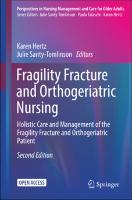Fragility Fracture and Orthogeriatric Nursing
Holistic Care and Management of the Fragility Fracture and Orthogeriatric Patient
| dc.contributor.editor | Hertz, Karen | |
| dc.contributor.editor | Santy-Tomlinson, Julie | |
| dc.date.accessioned | 2023-11-13T16:41:45Z | |
| dc.date.available | 2023-11-13T16:41:45Z | |
| dc.date.issued | 2024 | |
| dc.identifier | ONIX_20231113_9783031334849_11 | |
| dc.identifier.uri | https://library.oapen.org/handle/20.500.12657/85048 | |
| dc.description.abstract | This second edition, in Open Access, aims to provide a comprehensive and practical overview of the knowledge required for the assessment and management of the older adult with or at risk of fragility fracture, with additional focus on those who are frail. It considers this from the perspectives of all the clinical and home care settings in which this group of patients receive care and is relevant to all global locations. The concept of orthogeriatric care is explored in detail. Global estimates suggest that there were 21 million men and 137 million women aged 50 years or more at high fracture risk in 2010. This incidence is expected to double by 2040, with the most significant increase in Asia. Fragility fracture is one of the foremost challenges for health care providers and thehe global demand for nursing care for patients with fragility fractures across the world is immense. Hip fracture is particularly challenging as these significant injuries often occur in frail older people requiring hospitalisation and orthopaedic surgery. Such injuries and associated surgery result in increased frailty, worsening health and wellbeing, pain, disability, reduced quality of life, loss of independence, and decreased life expectancy. Care providers need to understand the experience of fragility fracture from the perspective of patients and families so that direct improvements in care can be based on the perspectives of the users. Expert care of patients following fractures that require hospitalisation and orthopaedic surgery involves skill in the care and treatment of frail older people as we as individuals with an injury and undergoing surgery. Nurses have a significant role in interdisciplinary collaborative care provided through orthogeriatric models of care. There is increasing evidence that such models significantly improve patient outcomes. High quality, evidence-based orthogeriatric care is increasingly shown to have positive impact on outcomes for recovery, rehabilitation, and secondary prevention of further fracture. This book significantly supports the aims and values of the Fragility Fracture Network and, as such, supports the learning needs of nurses and other allied health professionals which will enable a comprehensive approach to nursing practice in orthogeriatric and fragility fracture care. ; Provides a comprehensive discussion of nursing the frail older person with a fragility fracture across Europe Based on a two-day workshop of like-minded specialist and advanced nurses from over 20 countries Acts as the course text/reader for a Europe-wide education programme in all relevant settings (Emergency Department, Fracture Clinic, Trauma Unit, Orthopaedic Ward, Rehabilitation setting) Open Access | |
| dc.language | English | |
| dc.relation.ispartofseries | Perspectives in Nursing Management and Care for Older Adults | |
| dc.subject.other | Orthogeriatric nursing | |
| dc.subject.other | Osteoporosis | |
| dc.subject.other | Elderly trauma | |
| dc.subject.other | Hip fracture | |
| dc.subject.other | Frailty | |
| dc.title | Fragility Fracture and Orthogeriatric Nursing | |
| dc.title.alternative | Holistic Care and Management of the Fragility Fracture and Orthogeriatric Patient | |
| dc.type | book | |
| oapen.identifier.doi | 10.1007/978-3-031-33484-9 | |
| oapen.relation.isPublishedBy | 6c6992af-b843-4f46-859c-f6e9998e40d5 | |
| oapen.relation.isFundedBy | 8bfae801-f4c7-4afc-a0f3-ac8a707961b0 | |
| oapen.relation.isbn | 9783031334849 | |
| oapen.relation.isbn | 9783031334832 | |
| oapen.imprint | Springer International Publishing | |
| oapen.pages | 307 | |
| oapen.place.publication | Cham | |
| oapen.grant.number | [...] |

